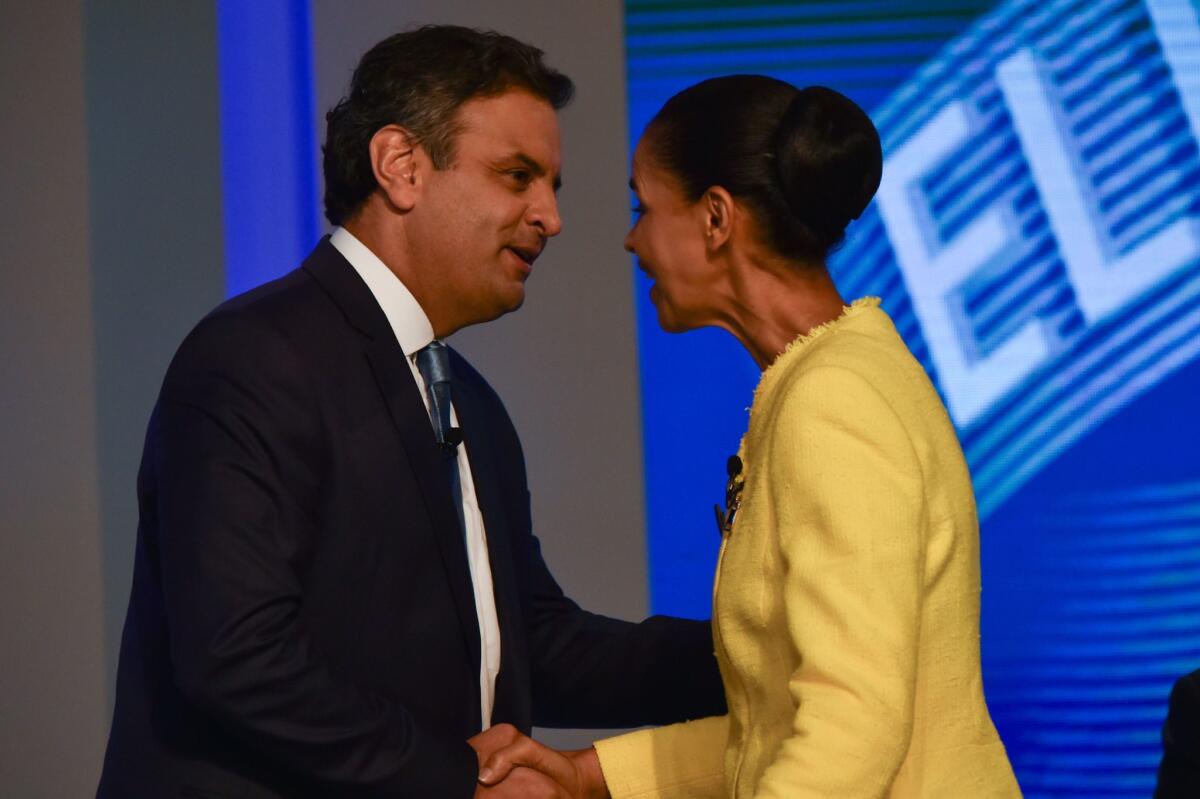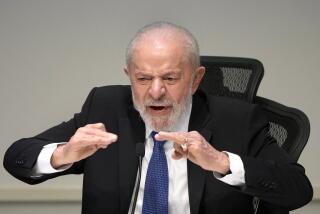Third-place finisher roils Brazil presidential campaign

- Share via
Reporting from Sao Paulo, Brazil — The former front-runner in Brazil’s presidential campaign shook up the race again Thursday when she unexpectedly withheld an endorsement for center-right candidate Aecio Neves, who is challenging incumbent Dilma Rousseff.
Marina Silva had turned the race on its head this summer when she stepped in to take the place of the Socialist Party candidate, who was killed in a plane crash. After a brief reign as front-runner, she was reduced to the role of spoiler when she finished third in the election’s first round, on Sunday.
But on Thursday, she appeared to step back from even that position when she canceled plans to announce an endorsement, which had been expected to be for Neves. She said she needed more commitments from the candidate, who will take on Rousseff in an Oct. 16 runoff.
“Alliances and coalitions are a big part of Brazilian politics, and it’s very important for Neves to get Silva’s support and to have her with him on TV and at campaign stops, since he needs around 60% of her voters to win,” said David Fleischer, a political scientist at the University of Brasilia. “If Marina stays away, she may be able to reinforce that she doesn’t play by the old rules of Brazil politics, but if she supports him and he wins, she gets influence and maybe a position in the new administration.”
Rousseff received 42% of the votes in the first-round balloting, with her strongest support coming from the poor. Neves, a Social Democrat, came in second with 34%, with his heaviest backing coming from Brazil’s wealthier regions. Voting is mandated by law in Brazil, although nearly a third of eligible voters failed to show up at the polls, or instead cast ballots for no one.
Long an outsider in Brazilian politics since she left the ruling Workers’ Party in 2008, Silva formed a brief marriage of convenience with the Socialist Party to run for vice president, but the election was upended when candidate Eduardo Campos died in a plane crash and Silva surged to the head of the polls, only to quickly drop back into third place.
In a statement released Tuesday, Silva said she would meet with allies to form a position on second-round support. But having delayed that decision, she may demand that Neves pivot to the left on issues such as support for rural social movements and indigenous rights, and that he retract a proposal to try minors as adults, according to statements made by her advisors in Brazilian media and a document published on her Sustainability Network website.
“The participation of each of our parties in the runoff round should reflect the necessity for changes,” she wrote, “and should not give up on explicit commitments and objectives.”
Neves has already secured the support of the Socialist Party, if not of Silva, as well as the Green Party and the Social Christian Party.
“From now on, this isn’t a candidacy that belongs to my party,” Neves said in a statement. “It becomes the candidacy of the broad desire for change.”
The left-wing Socialism and Freedom Party declined to support anyone explicitly but made it clear it opposes Neves.
Brazil’s complex political system is marked by constantly shifting and sometimes unwieldy alliances, and 28 parties earned a spot in Congress in Sunday’s elections. All major candidates, including Silva, support some kind of reform of the political system but have struggled for over a decade to garner congressional support.
On Wednesday, Rousseff reaffirmed her plan to call a national plebiscite on political reform while appealing to base voters in the poor northeastern state of Paraiba.
“Brazil needs political reform,” said Rousseff, whose party has governed Brazil since 2003. “No one has the strength to reform politics without popular participation and a plebiscite.”
Bevins is a special correspondent
More to Read
Sign up for Essential California
The most important California stories and recommendations in your inbox every morning.
You may occasionally receive promotional content from the Los Angeles Times.













